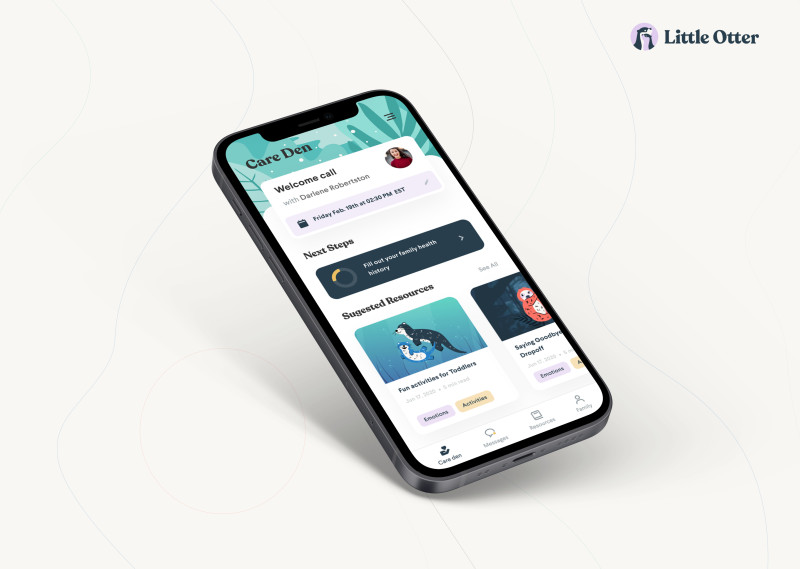- Iterate
- Meet The Team
- How One Mother-Daughter Startup Team is Making Children’s Mental Health Services More Accessible
How One Mother-Daughter Startup Team is Making Children’s Mental Health Services More Accessible
Table of contents
Rebecca Egger, an experienced product manager teams up with her mother, Dr. Helen Egger, a renowned pediatric doctor and early childhood mental health expert, to reimagine children's mental healthcare. The Org speaks with Rebecca Egger to learn about how Little Otter is changing the lives of families through technology.

One in six U.S. children between two to eight years old have a diagnosed mental, behavioral or developmental disorder, and many are left undiagnosed.
Although early diagnoses of mental health issues can make a significant difference in a child’s life, access to child psychiatrists in the United States is still significantly limited. An AAFP report showed that almost half of the children who had shown signs of mental health issues did not receive treatment or counseling from a mental health professional. This is particularly the case for low-income and less educated communities that lack health insurance.
“It’s really clear that there is a massive amount of need, but it isn’t clear where to find resources to really treat and support children’s mental health,” Rebecca Egger, co-founder of Little Otter, a startup that is on a mission to reimagine children’s mental health care, told The Org.
A mother-daughter team
To make child mental health services more accessible, Egger, an experienced product manager who served at the Chan Zuckerberg Initiative, Palantir Technologies and CommandIQ, decided to team up with her mother Dr. Helen Egger, a renowned pediatric doctor and early childhood mental health expert, who was the Division Chief for Child Psychiatry at Duke University School of Medicine and Department Chair and Director of NYU Langone Health Child Study Center to build Little Otter, an online mental healthcare provider for children up to 12 years old.
From the get go, Egger knew that she wanted her company to operate remotely. More than 70% of counties in the United States do not have a child psychiatrist, and Egger wanted to utilize virtual healthcare and telemedicine to bridge this gap.
“I raised our pre-seed round at the beginning of 2020, and at the time people were not really sure if telemedicine would work,” Egger said. “But as the pandemic was starting, we knew that we were in a mental health crisis and I began to notice a shift in my conversations with investors, partners and insurance companies when we started raising our seed [round].”
In fact, as a direct result of the pandemic, investments in telehealth have more than doubled in the second quarter of 2021 compared to what they were the same time last year. Six telehealth companies have claimed unicorn status in this time, bringing the total number of telehealth unicorns to 27, with an aggregate value of $55 billion.
The pandemic has also exacerbated mental health issues among children and adolescents. In October this year, the AAP, American Academy of Child and Adolescent Psychiatry (AACAP) and Children’s Hospital Association declared a national emergency in children’s mental health.
“We’re in a time where people are recognizing that you can deliver high quality care virtually, and that’s going to be the way we fix this problem,” Egger said.
After raising a $4.2 million seed round in May this year, Helen Egger was fully onboarded in the team, starting as the startup’s Chief Medical and Scientific Officer.
“I think both of us are really committed to building this amazing company, it’s been very exciting to do this together and it has brought us closer because we’ve been able to see each other in a different light,” Egger said.

Building the team
Little Otter has 18 employees and is expanding rapidly. The current operating model is split into two main areas of focus: the provider side and the business side.
On the provider side, there has been a heavy focus on hiring therapists and clinicians full time, each applicant goes through a rigorous interview process and once an offer is made, they are required to attend intensive training.
“We've expanded into a total of four states this year and so we've been doing a lot of supply-demand utilization to make sure that we're meeting the demand in the states that we’re operating in before we expand again,” Egger said.
On the business side, Egger is focused on hiring for roles that are focused on scalability. Filling positions for data strategy and engineering teams and looking to expand its product and marketing teams as well.
“I’m really excited about continuing to build up our community, it’s been incredible to see the impact that we’ve had on families that we’ve worked with already and if we can change the stigma and narrative around early childhood mental health, that to me is just going to be a bonus on top of our success,” Egger said.
Founders File Q&A
What is one piece of advice you wish you could tell your younger self?
I think the biggest piece of advice is to not get distracted by things that aren’t focused on what you’re trying to do. As a CEO, everyone is giving you advice at all times for every direction and as a new CEO, it was very easy to take all of that advice very seriously and change your mind based on it. I think the biggest thing is being able to take the information and then have a clear enough mission and direction to know what to pay attention to, and what not to pay attention to.
Since you come from a product background, what do you think makes a good product manager?
Being a good product manager is being able to make decisions with as little information as possible, and also being able to understand and fall on your sword when they are not working and switch quickly. It’s also about being able to gather a lot of intel from different types of people in the best possible way and piece it together to make a logical suggestion or decision that aligns with what the priorities are.
In a way, I think that being a product manager has really prepared me for being a CEO, because at the end of the day, I make have to make so many decisions without all of the context and recognize when those decisions weren't right, or when they are right. I think the other thing is helping the team align around decisions and goals. A strong PM is able to get everyone to feel like the decision they're going with is their own idea and not just leadership's.
What does your day usually look like?
A couple of months ago it was half operations, half management, but now every morning I ask myself what are my top three priorities are and what are the things that I have to deal with — so I usually can get one to three big tasks done early in the day.
Create your own free org chart today!
Show off your great team with a public org chart. Build a culture of recognition, get more exposure, attract new customers, and highlight existing talent to attract more great talent. Click here to get started for free today.
In this article


The ORG helps
you hire great
candidates
Free to use – try today